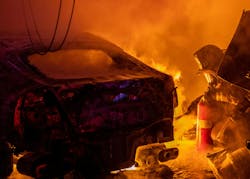Key Takeaways
- Focus on the 3 W's: who, where, and water supply that can simplify the initial fireground size-up reduce information overload.
- Use the"command bubble" technique to step back temporarily, gain objectivity, and improve strategic planning for your firefighters under stress.
- Accept uncertainty and delegate tasks effectively by knowing your personnel's skills, to reduces stress on fire chiefs and company officers to and enhances incident management.
Of all the jobs in the fire service the role of incident commander can often prove to be the most challenging. It can also be the most frustrating. The IC is responsible for the wellbeing of all personnel on the fireground and is accountable for the ultimate success or failure of the operation. However, despite the level of responsibility, an IC is not in a position that allows him to place a ladder, position a hoseline, or perform any of the hands-on tasks that are required to accomplish the job. He is in charge of it all, but must depend on others to resolve the problems encountered. Such a scenario can often make the role of the IC the most stressful position in firefighting. The ability to perform effectively under this stress can make or break an individual as an IC. The faculty to remain calm while running an operation is an absolute requirement for the job. Fortunately, there are a number of tools an IC can use to help him function effectively under stress.
Keep it simple
There is a lot going on at the initial stages of a firefight and a number of factors to consider in setting up a strategy. Establishing a water supply, forcing entry, laddering a building, and stretching the initial hoseline are all being accomplished at the same time in a noisy and often confusing environment. We are all trained to perform a traditional size-up that may take into consideration anywhere from 10 to 15 individual fireground factors. The problem is that the human brain is not geared to handle so much information at one time. An attempt to do so will inhibit your ability to make those vital intuitive assessments that form the basis of most of our fireground decisions. I have found it far simpler, and more effective, to initially consider three items:
- Who have you got?
- Where are they?
- Water supply?
Identifying who you have on scene, where they are located, and knowing if you have a water supply will set a good starting point for any operation. The “3 W’s” are quick and easy to establish and will enable you to initiate a strategy without feeling overwhelmed, and stressed out, by wrestling with too much information at once. Additional size-up factors can be addressed as the operation unfolds with a priority given to the fourth “W” (a way out of the building for your personnel if they happen to need an emergency means of egress).
Reboot your brain
ICs must continually force themselves to maintain the strategic, “big picture” view of an operation. Fire extension, workforce requirements, personnel relief and medical care must all be addressed. The IC cannot allow themself to get too deeply distracted by any of the individual tactical jobs being performed. That being said, the extent and stress level of his responsibilities can sometimes cause the IC to feel overwhelmed and freeze up the thought process. The ICs ability to effectively manage the incident can be put on hold. If that should occur it can be helpful to pause for a moment and “reboot” your mind by addressing one particular tactical issue. This might be as simple as addressing one of the four “W’s” or ensuring that a ladder or hoseline has been properly positioned. The act of becoming “task focused” for a minute will likely calm you down, free up your thought process, and allow you to retain the strategic perspective required to manage the incident.
The command bubble
There are occasions when “group think” can take effect on the fireground. If enough individuals are perceiving things in the same manner, it can seem as if they simply must be correct in their observations since they’re all thinking similarly. However, an IC’s perspective of a fire can be radically different from the reports received from personnel who are operating inside the building. Their view of the progress they are making in containing the fire may contrast significantly from the IC’s observation from the command post. Part of the job is to see through any inaccurate group think that may be occurring in the operation.
The command bubble is a concept, and a tool, which can help the IC in overcoming group think. It will allow an IC to think more objectively, plan more effectively, and momentarily reduce stress levels. There were often times when I briefly walked away from my own command post. Particularly in mid-Manhattan there was too much noise and too many distractions going on. I found that in stepping away from the chaos, even for a few moments, I was more relaxed, more objective, and better able to strategize.
However, if you surround yourself in such a “bubble” you must ensure that you’re not losing touch with what is happening on the fireground. It cannot be impervious to the vital observations and communication that must be maintained throughout the fire fight. The command bubble is a breath of fresh air, an effort in creating some space that allows you to think. It is not an escape from the stress of managing a fire but a tool that can allow you to function more effectively under that stress.
Communicate with purpose
Strong communication is the most effective tool for projecting a sense of confidence and solid command presence. You’ve probably worked for IC’s who had this ability. Those individuals were able to maintain a calm, reassuring presence that affected the confidence and capability of everyone working on the scene. On occasion you probably have also worked under the leadership of a fireground “screamer.” Their influence was just the opposite. As problems mounted, they only managed to increase the stress levels of everyone working at the fire. Their frustration and lack of control also took a toll on their own capacity to think, strategize, and handle their own stress.
Taking a moment to plan what and how you communicate on the fireground will allow for briefer and more effective radio messages. Before transmitting, take a deep breath, think about exactly what you wish to broadcast, and give that message in as slow, clear, and calm a manner as possible, even if a bit of “acting” is required to accomplish this. You will often find that not only are you communicating far more effectively but you will feel more confident in your role as manager of the fire. And with that your own stress level is likely to diminish.
Just as with size-up, simpler is better in communication. Do not hesitate to demand control of the fireground channel if there is too much radio traffic and communication is breaking down. A simple message telling all personnel to “stay off the radio unless urgent” will help you overcome this and maintain a sense of command.
Accept the uncertainty
Control freaks are likely to also be highly stressed individuals. An IC has to accept the fact that much of the activity occurring in the fireground will be beyond his direct control. You may want to accomplish several tasks early in the operation, but priorities and time limitations will limit what you can individually accomplish. You can’t personally stretch that second hoseline or check the conditions on the floor above the fire. Add to that the unknown elements that exist in any fire—the substandard construction, questionable fire loads, or illegal occupancies. You will seldom have the level of the information you’d like to have regarding the building and the extent of the fire. In firefighting, as in life, much is to be done and much is uncertain.
The key to overcoming this conundrum is delegation. You are not going to be able to handle it all, so you are going to have to segment the problems and assign individuals to solve them. That means giving up a certain amount of control and trusting others to accomplish a task. And that may not be easy if you tend to be too control oriented. Taking the time to really know your personnel will help with this. Knowing the experience, competency, and skill levels of your fighters will enable you to make appropriate assignments when you delegate a task and to feel confident about their accomplishing those tasks. The end result will allow you to function as a less stressed, and more competent, IC.
Remain positive
Is that glass half empty or half full? That expression may be kind of trite but the way you answer it can say much about how well you will function on the fireground. At any fire operation you will initially be bombarded by a number of challenges, all seeming to require your immediate attention. Rather than feeling overwhelmed, view the situation as a series of small steps all of which will eventually lead to a resolution of the scenario. Perhaps you don’t yet have the fire under control or even established a complete picture of the location or extent of the fire. But consider the positive steps you have already taken. You may have already established a water supply or identified your attack stairway in a high rise building. An extra alarm or mutual aid request may have been transmitted for additional resources. Something as simple as identifying the three “W’s” may have been accomplished. All of these are constructive steps that can allow you to feel more confident and optimistic about the outcome of the operation. And an optimistic IC tends to be a very effective IC.
You’re only human
Whether they want to admit it or not, anyone who has functioned as the IC of a complex emergency scenario has felt high levels of stress, particularly if the operation was not progressing smoothly. Some are better at masking this than others, but all have experienced it. The “impostor syndrome” is real. If you are new to the challenge of functioning as an IC, you may not really feel like you are in fact “the chief.” If so, relax. Everyone has at some point gone through this and it is normal to go through a brief identity crisis as you take on a new role in life or in the fire service. Remember that no one is born to be an IC, it is a role that you gradually evolve into.
The path to becoming a calm and collected incident commander is not a straight one. There will be many twists and turns as you gather experience. However, keeping an open mind, learning from your mistakes, and the use of a few basic tools can ease your way into becoming a confident fireground leader.
About the Author

Thomas Dunne
Thomas Dunne is a retired deputy chief and 33-year veteran of the New York City Fire Department with extensive experience working in Mid-Manhattan and the Bronx. He has been the incident commander at hundreds of fires and emergencies in the city. Dunne lectures on incident command, fire safety, and human behavior in disaster at conferences and colleges across the country through his “Third Alarm Fire Training” seminars. He has written numerous articles for fire service publications and serves as an adjunct instructor for both the National Fire Academy and Kean University. He is the author of Notes from the Fireground, a memoir of his experiences with the FDNY, and a novel, A Moment in Time. His website is www.chieftomdunne.com.
